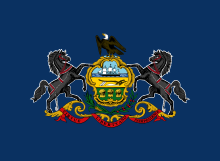Commonwealth (U.S. state)

Four of the constituent states of the United States of America officially use the name "Commonwealth". These states are Kentucky,[1] Massachusetts,[2] Pennsylvania,[3] and Virginia.[4] All four are among the first 15 states to join the Union.
This designation, which has no legal impact, emphasizes that they have a "government based on the common consent of the people"[5] as opposed to one legitimized through their earlier royal colony status that was derived from the monarch of Great Britain. The word commonwealth in this context refers to the common "wealth", or welfare, of the public[6] and is derived from a loose translation of the Latin term res publica (cf. the 17th-century Commonwealth of England).
The use of the term also derives from the use of English common law in the North American colonies.[citation needed] Some vestiges of the influence of common law can still be found in some legal concepts and principles in the Commonwealths, particularly in Virginia with its independent cities, which have their origin in the old English shire system, which was a part of how early Virginia was organized.[citation needed] The term is also used for the U.S. territories of Puerto Rico and the Northern Mariana Islands, although they are not states.
Besides the four aforementioned states, other states may also, on occasion, use the term "commonwealth" to refer to themselves. The State of Vermont, for instance, uses the term "Commonwealth" three times in its constitution, interchangeably with the term "State".[7] Delaware also called itself a "Commonwealth" in its 1776 constitution.[8]
Commonwealth of Kentucky

On September 28, 1786, the residents of Kentucky County began petitioning the Commonwealth of Virginia legislature for statehood. They wished the County to be recognized as a "free and independent state, to be known by the name of the Commonwealth of Kentucky." On June 1, 1792, Kentucky County officially became a state. As in Virginia, the official title of the elected local prosecutor in each of Kentucky's political subdivisions is the "Commonwealth's Attorney," as opposed to State's Attorney in other States or the more standard District Attorney.
Kentucky is the only state outside of the first 13 that uses "Commonwealth" in its name (although at the time of independence it was a part of the Commonwealth of Virginia).
Commonwealth of Massachusetts

Massachusetts is officially named "The Commonwealth of Massachusetts" by its constitution. The name "State of Massachusetts Bay" was used in all acts and resolves up to 1780 and the first draft of the constitution. The current name can be traced to the second draft of the state constitution, which was written by John Adams and ratified in 1780.[9]
In Massachusetts, the term State is occasionally used in an official manner, but usually in a compound structure rather than as a stand-alone noun. This is evident in the name of the agency "Massachusetts State Police," the Massachusetts State House and in "Bridgewater State Hospital".
Commonwealth of Pennsylvania

The Seal of Pennsylvania does not use the term, but legal processes are in the name of the Commonwealth and it is a traditional official designation used in referring to the state. In 1776, Pennsylvania's first state constitution referred to it as both "Commonwealth" and "State", a pattern of usage that was perpetuated in the constitutions of 1790, 1838, 1874 and 1968.[10]
A detailed history describing the origins of Pennsylvania's government, including its designation as a commonwealth from colonial times, is available from the Secretary of the Commonwealth's office.[11]
Commonwealth of Virginia

The name "Commonwealth of Virginia" dates back to its independence from the Kingdom of Great Britain. Virginia's first constitution (adopted on June 29, 1776) directed that "Commissions and Grants shall run, In the Name of the commonwealth of Virginia, and bear test by the Governor with the Seal of the Commonwealth annexed." The Secretary of the Commonwealth still issues commissions in this manner.
Among other references, the constitution furthermore dictated that criminal indictments were to conclude "against the peace and dignity of the Commonwealth." Additionally, the official title of the elected local prosecutor in each of Virginia's political subdivisions is the "Commonwealth's Attorney," as opposed to State's Attorney in other States or the more standard District Attorney.
In Virginia, the term State is occasionally used in an official manner, but usually in a compound structure rather than as a stand-alone noun. This is evident in the name of the agency "Virginia State Corporation Commission" and in "Virginia State Police", and as in the name of "Virginia Polytechnic Institute and State University".
The state university in Richmond is known as Virginia Commonwealth University (however, there is also a Virginia State University, located in nearby Ettrick, near Petersburg).
Criminal prosecutions
In Kentucky, Massachusetts, Pennsylvania, and Virginia, criminal prosecutions are brought in the name of the "Commonwealth." In California, Colorado, Illinois, Michigan, and New York, they are brought in the name of the "People." In all the other U.S. states, criminal prosecutions are brought in the name of the "State" while federal criminal prosecutions are brought in the name of the "United States of America."
See also
General:
References
- ^ Third Constitution of Kentucky (1850), Article 2, Section 1 ff. Other portions of the same Constitution refer to the "State of Kentucky".
- ^ Constitution of the Commonwealth of Massachusetts, Preamble.
- ^ Constitution of Pennsylvania, Preamble.
- ^ Constitution of Virgin Islands (1971), Article IV, Section 1.
- ^ See "Commonwealth", The Columbia Encyclopedia, Sixth Edition, 2001-07.
- ^ The American Heritage Dictionary of the English Language, Fourth Edition, 2000.
- ^ The Constitution of the State of Vermont, Chapter II, §§ 1, 8, and 71.
- ^ Constitution of Delaware (1776), Art. 23.
- ^ CIS: State Symbols[dead link]
- ^ PHMC: Pennsylvania History[dead link]
- ^ "History of DOS" (PDF). Retrieved 2012-01-04.
